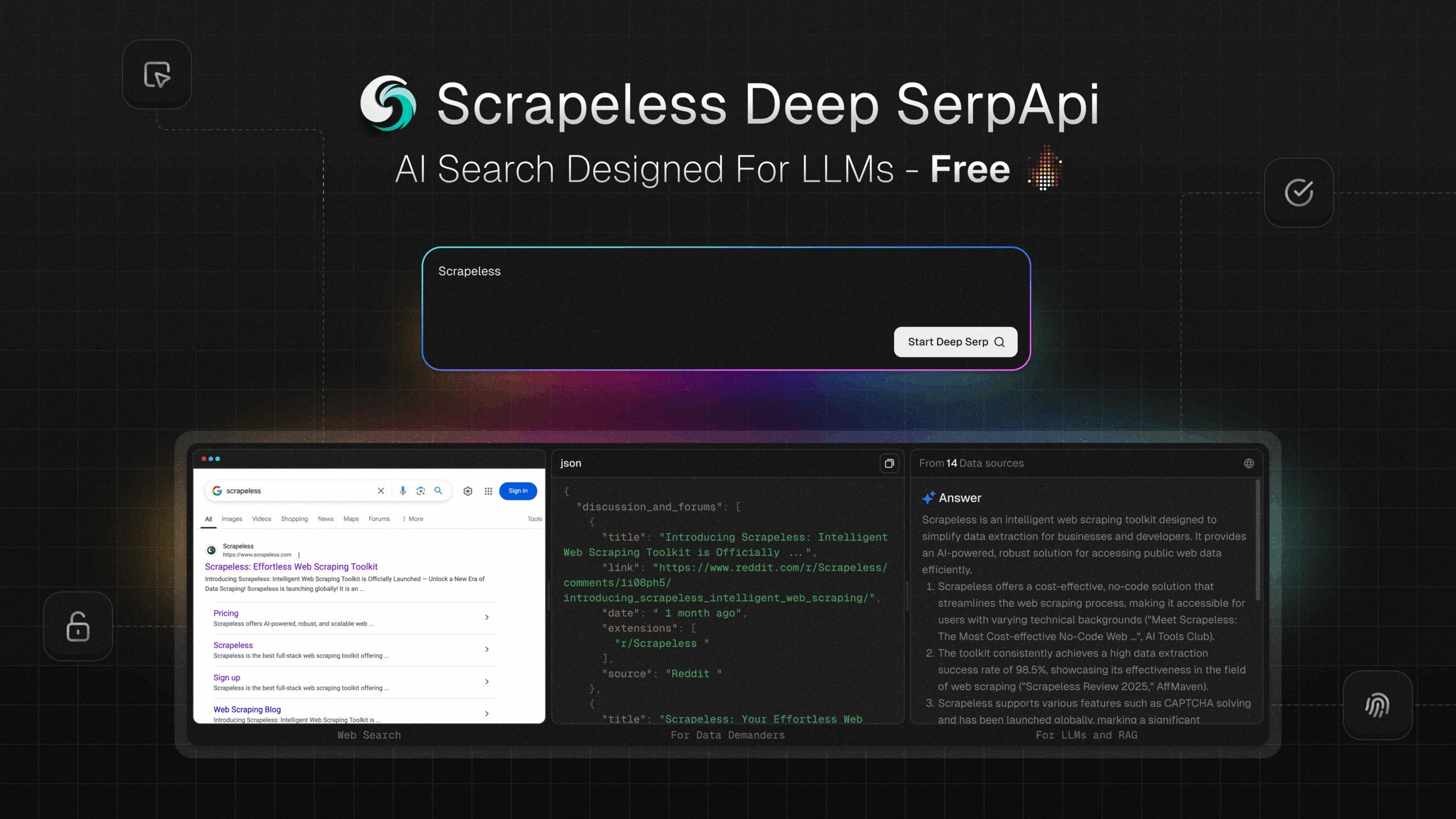Table of Contents
Overview
In the ever-evolving landscape of AI development, access to real-time, reliable data is paramount. Enter Scrapeless Deep SerpApi, a search engine API specifically designed to fuel the next generation of AI applications. This innovative tool provides a streamlined and ethical way to integrate search engine data directly into your AI models, bypassing the complexities and potential pitfalls of traditional web scraping. Let’s dive into what makes Deep SerpApi a game-changer for AI developers.
Key Features
Deep SerpApi boasts a powerful suite of features that make it an ideal choice for AI-driven applications:
- Real-time search engine API: Access up-to-the-minute search results, ensuring your AI models are always working with the latest information.
- Optimized for LLMs and AI agents: Designed specifically to integrate seamlessly with large language models and AI agents, providing the data they need in a format they understand.
- Structured response data: Receive data in a clean, organized format, eliminating the need for complex parsing and data cleaning.
- High performance and scalability: Built to handle high volumes of requests, ensuring your AI applications can scale as needed.
- No scraping required: Bypasses the need for traditional web scraping, offering an ethical and reliable data acquisition method.
How It Works
Deep SerpApi simplifies the process of integrating search engine data into your AI applications. AI developers integrate Deep SerpApi into their applications via API calls. The API then retrieves structured search results directly from the source, eliminating the need for scraping. This enables efficient and ethical data acquisition for real-time AI tasks. The structured data is then readily available for use within your AI models, enabling them to perform more effectively and accurately.
Use Cases
Deep SerpApi unlocks a wide range of possibilities for AI-powered applications:
- AI-powered search tools: Enhance search functionality with AI-driven insights and personalized results.
- Retrieval-augmented generation (RAG): Improve the accuracy and relevance of generated content by grounding it in real-time search data.
- SEO tools: Analyze search engine results pages (SERPs) to gain valuable insights into keyword rankings, competitor analysis, and search trends.
- Real-time fact-checking: Verify information in real-time by cross-referencing it with search engine results, helping to combat misinformation.
- Chatbot enhancement: Provide chatbots with access to real-time information, enabling them to answer user queries more accurately and comprehensively.
Pros & Cons
Like any tool, Deep SerpApi has its strengths and weaknesses. Understanding these can help you determine if it’s the right fit for your needs.
Advantages
- Fast and structured responses: Receive data quickly and in a format that’s easy to work with.
- Ethical data sourcing: Avoid the ethical and legal concerns associated with web scraping.
- Easy API integration: Seamlessly integrate Deep SerpApi into your existing AI development workflow.
Disadvantages
- Limited to supported search sources: The API’s coverage is limited to the search engines it supports.
- Potential API rate limits: Depending on your usage, you may encounter API rate limits.
How Does It Compare?
When choosing a search engine API, it’s important to consider the alternatives. Here’s how Deep SerpApi stacks up against some of its competitors:
- SerpApi: Offers broader engine coverage but relies on web scraping, which can be less reliable and potentially unethical.
- Google Custom Search: A reliable option, but offers limited customization and may not be suitable for all AI applications.
- Brave Search API: Focuses on privacy, but may provide less structured data compared to Deep SerpApi.
Final Thoughts
Scrapeless Deep SerpApi offers a compelling solution for AI developers seeking a reliable, ethical, and efficient way to integrate search engine data into their applications. Its focus on structured data, real-time access, and LLM optimization makes it a valuable asset for a wide range of AI projects. While it may not be the perfect fit for every use case, its strengths make it a strong contender in the search engine API landscape.
